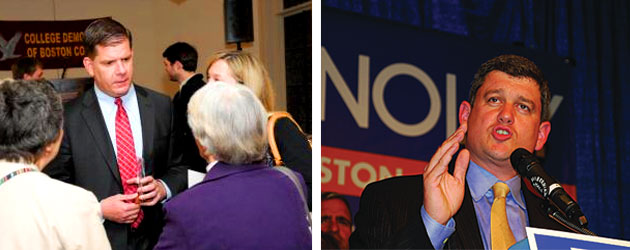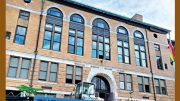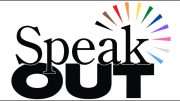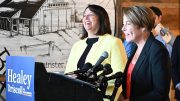By: Chuck Colbert/TRT Reporter—
BOSTON, Mass. – Boston voters have decided. The finalists in the November 5 election for mayor are a Beacon Hill lawmaker and a Boston city councilor, both ardent backers of LGBT equality. Now, as State Representative Martin J. Walsh of Dorchester squares off against Boston City Councilor-at-Large John R. Connolly of West Roxbury, the race promises to be important for the city’s gay community, which for two decades has enjoyed unbridled championing of LGBT equality from Mayor Thomas M. Menino.
“This is a very important election,” said a West Roxbury lesbian mother, Emily Engler, who is backing Connolly. “It’s going to set the tone for the Boston Public Schools.”
At this point, who will prevail in November is anybody’s guess, with candidates scrambling to pick up votes and broaden their bases of support across the city’s 255 precincts. If the preliminary election is any indicator, the mayoral race might well be a close one. Walsh was the top vote getter (18.47 per cent) on Tuesday, September 23, with Connolly (17.22 percent) right behind him. Only 1,418 votes separated the two candidates out of a total of 112,804 total votes cast among a field of a dozen contenders.
In their scramble for votes, moreover, Connolly and Walsh have said they view the gay community as a vital constituency, one not to be ignored. Recent telephone interviews with the candidates, as well as phone conversations and email correspondence with supporters, shed light on what matters to LGBT voters as Boston heads into a new, post-Menino era.
Because marriage equality is secure in the Commonwealth, other concerns have risen to the forefront, including safer schools, public health and safety, economic opportunity, culture and the arts, among other issues. Still, “One of my proudest votes ever,” a fired up Walsh told supporters at preliminary election night celebration in Dorchester, “was to defend gay marriage.”
In fact, during the same-sex marriage struggle (2004 to 2007), state Representative Walsh, age 46, of the 13th Suffolk District, served as floor whip for MassEquality, persuading colleagues not to advance an anti-gay ballot measure that would have rolled back marriage gains ushered in by the historic Goodridge decision.
A labor-movement advocate for working people, Walsh, who goes by first name Marty, was first elected to the Legislature in 1997. For Walsh backer Peter Sasso, Walsh’s political courage in the Legislature has made all the difference.
“I am supporting Marty Walsh because of his character and commitment to principles,” Sasso said. “One important example to me is his support of gay marriage many years back when it was a very unpopular issue. I had spoken to other elected officials and many were satisfied with civil unions. This was not what the LGBT community was looking for because it would not give us the benefits that we deserve in an equitable society. [It] was a very contentious issue, and Marty knew how important this vote would be and what his support would mean to all of us who struggle for equality every day. Against the advice and admonitions of family, friends and his parish priests, Marty voted for gay marriage. At a time when he could have compromised, he stood strong when it was not a popular stand. I will never, ever forget him for standing up for me and future generations whose marriages will receive equal treatment in the future.”
That was then, and this is now.
“The issues of concern to the gay community are a lot different than 20 years ago,” Walsh said in a phone interview. “We’ll start with gay marriage.”
Concerns about equality today, “are just the same as everyone else,” he explained. “Families with gay children who want good quality schools. We have educated people who are worried about employment opportunities, not being able to find jobs.”
Walsh also noted “Public safety concerns depending on neighborhoods where people live all over the city,” with some having “tougher ones than others.”
According to Walsh, culture and the arts need a boost from the mayor’s office.
“We are not truly capitalizing on [the arts, culture and tourism] as much as we can,” said Walsh, who, like Connolly, advocates a designated cabinet-level administrative position for the arts.
Walsh and Connolly differ on the city’s Payment in Lieu of Taxes, or PILOT, a program, in which the city bills nonprofit organizations exempt from property taxes. In most major cities, arts and cultural institutions receive public funding from local government — and are not billed by local municipalities.
Walsh supports PILOT while Connolly wants to “rethink” it “because it doesn’t work,” he told the Mass Creative/Create the Vote coalition in late August.
A relative newcomer, the one-year-old Create the Vote organization is recruiting “arts voters” and encouraging them to make the arts and culture a priority when voting for the next mayor of Boston, according to its website.
Craig Coogan, executive director of the Boston Gay Men’s Chorus, could not agree more with Create the Vote’s efforts.
“It is important to have a mayor who is an arts advocate,” Coogan said, in addition to “having a financial investment in the arts. It really should be a line item in the budget.”
Create the Vote’s executive director, Matt Wilson, noted that Boston lags behind other comparable cities in expenditures for the arts.
“If we put ourselves in the category of a major city,” for example, “Philadelphia, San Francisco, or Chicago,” Wilson said, “these [municipalities] spend an average of between $10 to $20 per person on the arts. We spend about $1.50.”
Meanwhile, the LGBT community, Coogan explained, has a vested interest in culture and the arts.
“Members of the chorus are strong arts advocates” as “participants, donors, and buyers,” Coogan said.
Another issue Walsh discussed was using the bully pulpit of the mayor’s office to raise awareness on HIV/AIDS. At the same time, he said his Beacon Hill experience will enhance his advocacy.
“I can certainly advocate with the state as much money as possible into the various organizations,” he said. “I have those relationships as a state representative. As mayor, I am not going to lose those relationships on Beacon Hill.”
Walsh was referring to ties with colleagues in the Legislature, as well as to various non-profit organizations, such as community-based health-care service providers.
Walsh also said he views the Boston Public Health Commission as a key player in combating new HIV infection “in talking about clean needles and getting dirty needles of the street,” he said.
Rates among Black and Latino MSM (men who have sex with men) and transgender women are skyrocketing, according to various sources that track HIV transmission data.
With respect to safe schools and bullying, Walsh drew a clear line.
“We need to educate young people and make sure that adults,” too, “understand no discrimination of any shape or form” will be tolerated in Boston’s “education around health policy and sex education in the schools so that kids and parents understand how hurtful [bullying and misinformation] can be,” Walsh said.
In all, Walsh sketched out several overarching themes — fairness, equality, and opportunity for every resident, “safer streets, better schools, and good jobs in a new economy,” he said.
“We are stepping into a new era,” said Walsh. “The next 20 years will be different, with new problems and opportunities, new challenges.”
What resonates the most with Susan Moir of Jamaica Plain in her support for Walsh is economics.
“He has done more to create jobs for women and people of color in this city than anyone ever has done in the past,” Moir said. “That’s why I am with him.”
Similarly, Charles Martel of the Fenway neighborhood is equally adamant about his support for Connolly.
“Having known John for more than six years, he has been a consistent friend of the LGBT community by his sincere support and presence,” said Martel. “As mayor, John would continue to embrace and work with our community. I know John for his integrity, and a man who keeps his word. He gets things done.”
During a telephone interview, Connolly, age 40, who was first elected as city-councilor-at large in 2007, talked about his vision for a new Boston.
“I’ve been committed to a more inclusive Boston my entire life,” Connolly said, “starting with growing up in a very divided Boston and knowing I got the best out of Boston, but knowing so many did not and wanting to work for a more inclusive Boston.”
Referring to his pro-bono legal work with the Pridelights Foundation, which he helped merge with AIDS Action Committee, Connolly said his work on LGBT issues predated his time in politics.
“I am very proud of my work because Pridelights was dedicated to building bridges across communities and raising awareness about LGBT issues,” Connolly said.
He also noted that during his time on city council, he has been a strong supporter of transgender equality.
Both Walsh and Connolly said they favor adding “public accommodations” to the state’s 2012 transgender equal rights legislation and said they would advocate it on Beacon Hill.
One of Connolly’s signature efforts is leading the charge to bring the Gay Games to Boston.
“If the mayor says this is a priority, then this will happen,” he said. “I want this to happen because it’s another way for Boston to show we’re the most LGBT friendly city in the country, hopefully the world. If not, then that’s what we’re striving for — that we are a global city.”
Bringing the games to Boston, Connolly said, “is a way to show that we believe in an inclusive city as one of our paramount values. That’s why I want to bring the Gay Games here.”
Connolly also detailed part of “an LGBT agenda” that includes priorities on safe schools. He said he favors supplemental legislation to the state’s anti-bullying law, passed in 2010, that would make sure “we’re tracking and following the data” to ensure “that every young person is safe at school and going into a supportive environment where they can thrive as a person.”
Both Connolly and Walsh said they favor efforts on Beacon Hill — championed in part by MassEquality, a statewide grassroots LGBT advocacy organization — to add enumerated categories, such as “sexual orientation” and “gender identity” to the existing 2010 state law.
“When I look at the suicide rates, dropout rates, homeless rates,” said Connolly, “as a father, I want to cry.”
MassEquality points to a 40 percent estimate of unaccompanied homeless youth who are gay, according to Carly Burton, deputy director.
Perhaps no surprise, a former intermediate school teacher and Boston Public School (BPS) parent, Connolly has staked out transformation of the city’s public schools as another signature issue.
“I want to make sure that we can do everything to support our young LGBT students who face great challenges when they go into the schools,” Connolly said. “I will be a strong advocate for strengthening the anti-bullying law and making sure we are implementing it in every Boston public school so that every school is [a] place where we accept people for who they are and celebrate them.”
LGBT friendly and safe schools are of much concern for Engler, mother of a three-year-old daughter who will enter the BPS’s lottery for a K-1 slot next year.
“I have a lot of friends who are two-mom families, two moms working and really concerned about good schools,” she explained. “The schools are a place for kids to see families like theirs and also not like theirs, and there are not many two-mom and two-dad families in the school system.”
For Connolly backer Andrew Parthum of the South End, it’s the councilor’s well-rounded approach to gay rights that is appealing.
“He is sincere about education…as a city councilor, he supported marriage equality, he marches in Pride parades, and supports Transgender Awareness Week, and would like the Gay Games to come to Boston,” said Parthum.
The gay community is important to Connolly, added Parthum.
“In one of John’s ads, he has a Mass Equality button and a John Connolly button with a rainbow background. He doesn’t mention it in the ad, but you notice it.”
Nonetheless, not all members of the LGBT community have made up their minds yet.
“I’m holding off making a decision because I need more information about how the candidates stand on public safety/public health issues affecting the LGBT community,” said veteran gay-rights activist and lawyer Don Gorton of the South End. “The Anti-Violence Project is sending out questionnaires and will release a voter guide on these issues. Stay tuned!”
Gorton heads up the anti-violence group.
As for the issue of openly gay members still banned since the mid-1990s from marching in South Boston’s St. Patrick’s Day Parade, Connolly and Walsh are in agreement, though each have slightly different takes.
“What needs to happen,” said Walsh is a private “conversation” away from the media’s glare, with “organizers of the parade.”
“As mayor, I will sit down with them and work out a compromise so that people can feel like they can march in the parade,” Walsh said. “This parade should be inclusive, and that goes for every other parade marching on public streets.”
Connolly holds essentially the same view.
“I will certainly maintain the mayor’s commitment not to support a parade that discriminates,” Connolly said. “One thing that the next mayor needs to do is maintain, in the most passionate way, Mayor Menino’s deep commitment to LGBT equality as part of an inclusive Boston. One way to do that is to publicly advocate for the parade to change.”
“Unfortunately, a lot has to do with the parade committee and the U.S. Supreme Court’s backing of them,” Connolly said, referring to a 1995 unanimous decision, Hurley vs. Irish American GLIB Association, in which the nation’s highest court ruled parade organizers, the South Boston Allied War Veterans Council, had the right to determine who marches in the annual event.
The final election between Walsh and Connolly will take place Tuesday, November 5.









